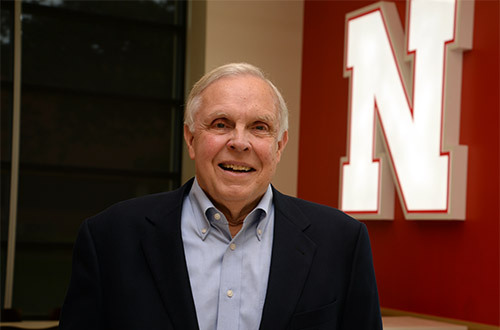Last year, Web of Science, an online scientific citation indexing service, named Dr. Fred Luthans, University and George Holmes Distinguished Professor Emeritus of Management, to the “Top 1% Citations” list of researchers around the world in all fields. Now, in an article in
Scientometrics, a peer-reviewed academic journal, a new study of citations over the past 10 years in all fields of Business and Economics (B&E), again shows Luthans recognized for placing in the top one percent of all B&E professors in the world.
Luthans rated higher than all Big 10 management professors, and was tied at No. 34 for highly cited papers. For the widely acclaimed h
-index, Luthans is tied for tenth highest overall with Economics Nobel Laureate Dr. J.J. Heckman. Luthans h-index of 98 represents 98 publications with 98 or more citations. His i10-index of 220 denotes the number of publications he has with 10 or more citations.
“The h-index is important because it objectively measures the impact of your research,” said Luthans. “The h-index is recognized by faculty because it’s how promotions happen and how grants are awarded. To put it in perspective, recent Economics and Finance Nobel Laureate Richard Thaler’s current h-index is 96 and i-10 is 155.”
Luthans’ current Google Scholar profile stands at more than 68,000 citations. Digital Commons recently indicated the nearly 350,000 downloads of his articles are one of the highest. Last year in various categories of business and management he ranked first, second and third. Additionally, a recent study in the
Academy of Management Learning and Education, determined him to be the most frequently cited author in organizational behavior textbooks used by management students.
“Fred’s impact in management education is far reaching,” said Dr. Kathy Farrell, James Jr. and Susan Stuart Endowed Dean of the College of Business. “The
Scientometrics article finds Fred is one of the top 50 most influential scientists in the field of Economics and Business based on citation rankings. This is a tremendous accomplishment and testament to how his work regarding positive psychological capital has impacted businesses and management research. His work has also impacted our students through his teachings over the course of his more than 50-year career. Many of our alumni consider Fred as one of their most impactful and memorable faculty members.”
 Luthans continues his PsyCap research at Howard L. Hawks Hall.
Luthans continues his PsyCap research at Howard L. Hawks Hall.
At the turn of the century, Luthans founded the multi-dimensional core construct and measure of what he called psychological capital or simply PsyCap. Drawing from the then newly emerging positive psychology, the inclusion criteria he set for PsyCap were that the positive cognitive resource must be based on theory and research, have valid measurement, be state-like and open to development and have desired impact. The psychological resources which were determined to meet these criteria were: hope, efficacy (confidence), resilience, and optimism, or as Luthans called them, the HERO within.
“We built the theory and research first at the individual level aimed at desirable workplace attitudes, behaviors and especially performance. However, in recent years increased attention has been given to mental and physical well-being, and expanding research and application into group and organizational levels, such as in education, the military, sports, health care and across cultures,” said Luthans.
He is also giving increased attention to developing PsyCap. For example, one of his studies with former doctoral students Dr. James Avey and Jami Patera, experimentally analyzed a web-based training intervention to demonstrate how PsyCap can be developed in adult employees. This work was recently named winner of the
Academy of Management Learning and Education Article of the Decade Award. Such research and theory-building serves as the foundation for PsyCap, which is then cited by PsyCap researchers around the globe.
Evidence-based PsyCap is now being drawn from across the world to better understand and improve leadership, teams, human resource management, attitudes, performance and well-being. Some high-profile, real-world PsyCap adopters include NASA, FEMA, American Family Insurance, Shell Oil, Boeing, VA Health Care System, DuPont, U.S. Army, Burger King, Harvard Medical School Cancer Institute, China Mobile, Norway Maritime Industry and the Chinese Academy of Science Child Development Program.
“I believe in today’s turbulent, high-stress environment – which faces people in every profession – such a positive, evidence-based approach to performance and well-being as found in PsyCap can have unlimited future growth potential for even better understanding and application.”
Published: August 7, 2018